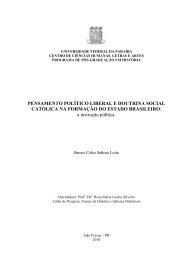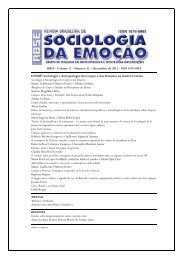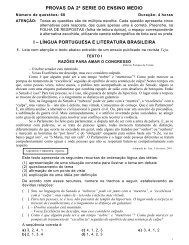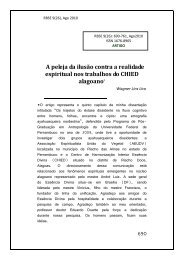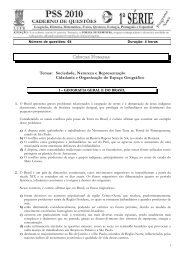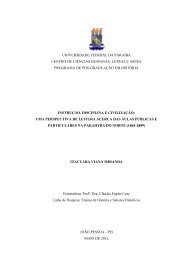abril de 2004 - CCHLA - Universidade Federal da ParaÃba
abril de 2004 - CCHLA - Universidade Federal da ParaÃba
abril de 2004 - CCHLA - Universidade Federal da ParaÃba
Create successful ePaper yourself
Turn your PDF publications into a flip-book with our unique Google optimized e-Paper software.
Generated by Foxit PDF Creator © Foxit Softwarehttp://www.foxitsoftware.com For evaluation only.science, has turned us into blind men and women tryingto <strong>de</strong>scribe an elephant.Routine is not the enemy of science, since it savestime, effort and emotion. Like all other problems, humanproblems require both routine and innovation. Kuhn(1961) famously ma<strong>de</strong> this point over forty years ago. Hisi<strong>de</strong>a of "normal science" is the equivalent of what I amcalling scientific activity based completely on routines.Kuhn’s point was that these routine uses of scientificmethod are effective when employed as the "mopping up"operation in the wake of a great discovery. The HumanGenome Project provi<strong>de</strong>s an example: routine procedurescan be used to map genetic materials because of thediscovery of the structure of DNA.Perhaps Kuhn was too gracious to note thatscientific routines are ineffective, even useless, whenthere has been no great discovery. This is the situationfaced by human science. Routine becomes <strong>de</strong>structive tothe extent that it takes over completely, exiling innovationand change [2] . There are areas in the human scienceswhere this has already happened, as seems to be the casein self-esteem research, to be discussed below. Manyother areas may be approaching a similar <strong>de</strong>adlock.Studies of suici<strong>de</strong> like Durkheim’s, mentione<strong>da</strong>bove, provi<strong>de</strong> an example of the problem of researchthat is not based on a great discovery. Although hisfindings have been replicated, the correlation between<strong>de</strong>gree of social integration, however it is in<strong>de</strong>xed, andsuici<strong>de</strong> rates is always quite small, accounting for lessthan 10% of the variance. The tiny size of the correlationsuggests that other factors are involved, perhaps manyothers. The theory of social integration does not explainthe major cause(s) of suici<strong>de</strong>.There was a legitimate reason for Durkheim’sstudy: he was establishing sociology as an approachseparate from other disciplines, especially separate frompsychology. But now that sociology, psychology, an<strong>de</strong>conomics have all been established as separatedisciplines, it seems futile to try to explain human conductexclusively within a single discipline.Cases in point are the Blau and Duncan study(1967) of incomes and the replications of it. These studies113



